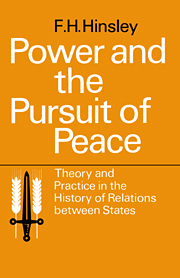Book contents
- Frontmatter
- Contents
- INTRODUCTION
- PART I A HISTORY OF INTERNATIONALIST THEORIES
- PART II A HISTORY OF THE MODERN STATES' SYSTEM TO 1900
- PART III INTERNATIONAL RELATIONS AND INTERNATIONAL ORGANIZATIONS IN THE TWENTIETH CENTURY
- 12 International Relations in the First Half of the Twentieth Century
- 13 The First World War
- 14 The Failure of the League of Nations
- 15 The Causes of the Second World War
- 16 The Nature and Development of the United Nations
- 17 International Relations since the Second World War
- References
- Index
14 - The Failure of the League of Nations
Published online by Cambridge University Press: 11 January 2010
- Frontmatter
- Contents
- INTRODUCTION
- PART I A HISTORY OF INTERNATIONALIST THEORIES
- PART II A HISTORY OF THE MODERN STATES' SYSTEM TO 1900
- PART III INTERNATIONAL RELATIONS AND INTERNATIONAL ORGANIZATIONS IN THE TWENTIETH CENTURY
- 12 International Relations in the First Half of the Twentieth Century
- 13 The First World War
- 14 The Failure of the League of Nations
- 15 The Causes of the Second World War
- 16 The Nature and Development of the United Nations
- 17 International Relations since the Second World War
- References
- Index
Summary
It was a misfortune for the League of Nations that it was brought into existence in these conditions of unusual international instability. But this fact has also had an unfortunate effect on our investigations into the League's failure. Everything we know about the history and the nature of international relations goes to show that the League, as it was constructed, was bound to fail; and that it was bound to be constructed as it was constructed. But those who seek to explain its failure usually argue that the League was based on sound principles and failed only because it was unlucky or premature. Or because, though sound in conception, the principles behind it were faultily applied or inadequately applied.
The argument that it failed because it was ill-timed or unfortunate takes two forms. Some people argue that the founders of the League imagined that it would be working in a normal world. The world in which it had to work was abnormal and unstable. The drafters of the Covenant overlooked the rise of aggressor nations and failed to take into account that there would be so much war-weariness among the peaceful and progressive populations of the world. If only the world had been normal, this school of thought asserts, if only it had been less beset with problems, the League would have pulled through.
- Type
- Chapter
- Information
- Power and the Pursuit of Peace: Theory and Practice in the History of Relations Between States , pp. 309 - 322Publisher: Cambridge University PressPrint publication year: 1962

